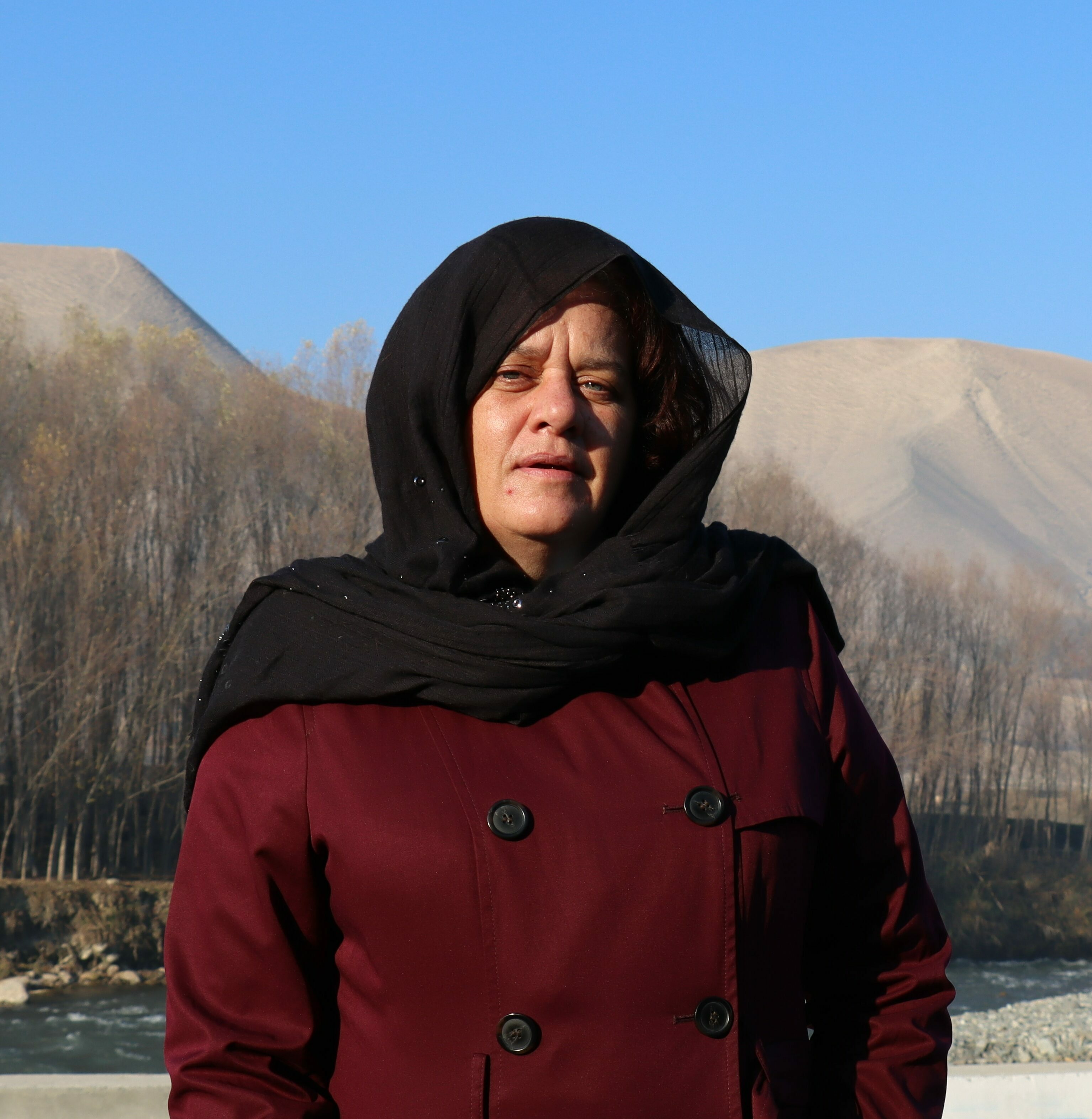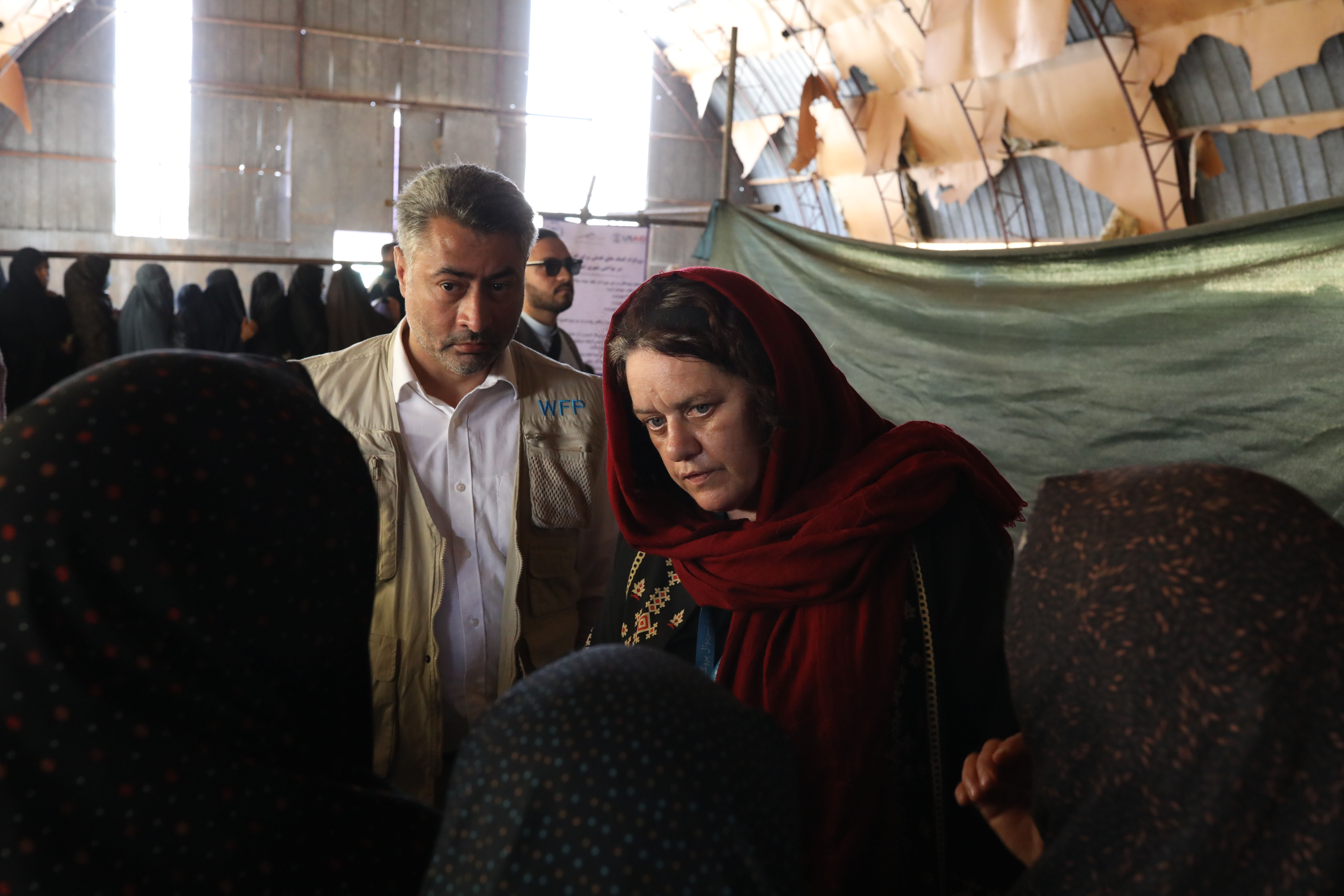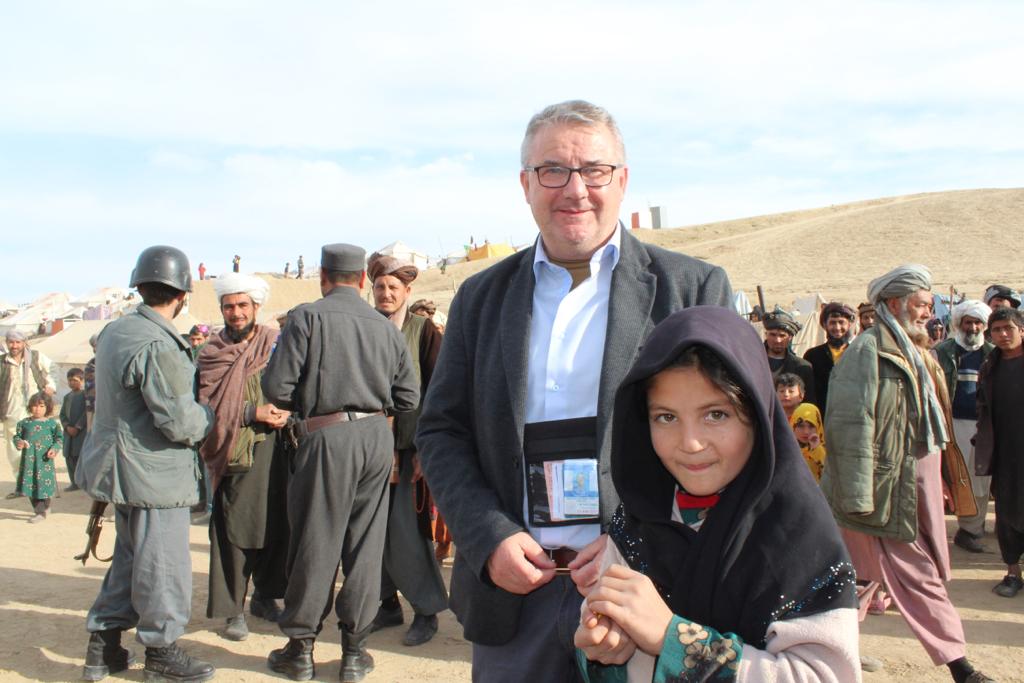
That footprint grew further in April with the signing of an important new Memorandum of Understanding (MOU) between the university and the UN’s International Organization for Migration (IOM). The MOU is the first of its kind in Ireland and cemented a formal partnership between NUI Galway and IOM on a pilot project to tackle toxic disinformation on migration.
Two of our Alumni currently working in Afghanistan have had one of their most difficult years to date. Both are leading efforts to prevent famine and humanitarian catastrophe in one of the world’s most dangerous places.
Mary-Ellen McGroarty is Country Director of the UN’s World Food Programme for Afghanistan, based in Kabul. A graduate of then University College Galway (UCG) (BA Law and Economics, 1987; LLB, 1993), she returned to NUI Galway in 2018 to complete a LLM in Human Rights Law.
After finishing her LLB, the Donegal woman took a year off to work with Irish NGO Goal during the Rwandan genocide, fully intending to go back to Ireland to practice law. But instead, she was to start what has become a career at the forefront of some of the world’s most acute global challenges, working with the UN’s World Food Programme.
Her first overseas posting in Rwanda was hugely challenging, she admits. “It was a massive shock to the emotions. To see that level of violence was quite a jolt. My father used to be a stonemason and made tombstones – and to come across mass graves, for me as a youngster growing up in Donegal, that was quite a culture shock and an emotional shock to see how cheap life can be – the scale of death and the scale of hatred.
“Back then you got $50 a month to ring home and Donegal was a long, long way on the telephone. I’m sitting in a country today where I see a different war going on. The injustice of it and the scale of it is quite something. You always remember your first one, and how you felt in the first couple of weeks – trying to process what it was like for people every day, many families torn apart by the violence, and thousands of orphans.”
Mary-Ellen has risen through the ranks to become one of the most important women in the UN’s global assistance agency network, responsible for a multi-billion dollar budget and 450 staff. But she did it the hard way, earning her stripes in postings in Sudan, Chad and a number of other conflict zones, “throwing my hat in the ring,” as she says, before being asked to take on the Country Director role in Kabul. “Afghanistan was one I was avoiding. But while I don’t think I regret it, it’s certainly been a bumpy year,” she admits.

Little did she know that within months of her arrival, the country would be thrown into chaos with the withdrawal of international military and the return of the Taliban. “I remember thinking it wasn’t going to be easy because we had seen a massive increase in the conflict after Doha, so trying to navigate the security challenges and open conflict, and managing the politics, was going to be difficult. And then we had what happened in August and we were all stunned by that,” she admits.
“The last four months have been very difficult – we were all worried that there was going to be a lot of urban battles, but there wasn’t a shot fired coming into Kabul. There are some days I wish I hadn’t been here before 15 August, because now when you listen to people, you hear the aspirations and the dreams and the hopes have been wrenched away from them.
“When you were here and you saw what it was like, and what it’s like today, it’s very difficult. You’ve got a humanitarian crisis and an economic crisis that is now engulfing the country, which is something we are just stunned about, the real injustice of it is happening to the people of Afghanistan.”
Her role as country director puts her in the crosshairs of that crisis. “We’re watching it get worse week by week,” she admits. Drought, displacement, and the fragility of the security situation pre-August were already making things difficult. Post the return of the Taliban, overseas development aid has been cut off, $9bn in Afghanistan reserves are frozen abroad, and development projects are all on hold. Hundreds of thousands of Afghans have lost their jobs, and hundreds of thousands more, mainly women, have been forced out by the new regime.
“We’re seeing the number of malnourished children increase week on week. I’m meeting people who are screaming at me for food, women who have lost their jobs; cleaners, construction – all that is at a standstill. I met farmers last week who told me they’ve lived through 19 governments and have never had it as bad. In the last five days, we’ve seen the local currency depreciate by 25 per cent, the price of bread is doubling overnight, it’s freezing cold here and the price of fuel is doubling. It’s absolutely desperate – people selling their entire household belongings to buy food, women going without food for days, children are malnourished.”

She’s now sitting in the middle of a geo-political quagmire between the Taliban and the international community to ensure more than 20 million people don’t starve in the harsh Afghan winter. “We need a massive scale-up in the humanitarian response – that’s one piece of it and that has to be done because people are at the brink. At the level of the Security Council, we need a humanitarian carveout from the sanctions to allow the humanitarian response to be able to move. We also need some bold and brave solutions from the Security Council that don’t choke the Afghan people. I appreciate that the international community will say ‘we can’t do business with the Taliban and we can’t recognise them’, but it is the ordinary people of Afghanistan that are suffering, it’s not the Taliban sitting in the palace that are suffering,” she says.
But she is firm that the Taliban also needed to move on issues such as girls’ education and the rights of women, including the right to work. As a woman, she admits, it’s difficult for her female staff. “I’m not really concerned for my own safety. I lead up a UN organisation, I meet the acting ministers and governors when I’m out in the field. But what I really see is the absolute trauma that the women of this country are going through. They can’t go to work, many have daughters who can’t go to school or university – those hopes are gone. It was certainly far from perfect before, but a terrible darkness has fallen on the hopes and dreams of girls and women now.
“That’s what gets me as a woman leader – I am who I am and they have to deal with me. As humanitarians we have to remain neutral, and maintain the humanitarian imperative. As a woman, I’m struggling to understand it, when there are such big economic issues to be addressed, that the issue of women and girls’ education is what preoccupies them [the Taliban].”
Right now, she says, it’s hard to be optimistic. The Taliban are not a homogenous unit, and there are already signs of leaders jostling for position, and old systems of patronage and power dynamics playing out.
“We would be concerned about fragmentation [of the Taliban]. If people can get across the winter and don’t see things are improving they’ll start to move. We’re also getting worrying reporting that Isis K (the Islamic fundamentalist splinter group) are recruiting. So radicalisation, migration, civil unrest, if we don’t get some oxygen back in the economy, if people have nothing to lose then it’s not a very optimistic picture,” she adds.
Despite the difficulties, Mary-Ellen says she would do it all over again, and advises young graduates interested in a career on the front lines of international diplomacy and humanitarianism to go for it.
“Learn your languages because they are easy to carry, and go for it. Be willing to learn and be willing to seek out adventure and learn about other people and other cultures. I would do it all over again if I could. If you have a sense of social justice that our world can be a better place, then go for it,” she adds.

Sean Ridge is a senior humanitarian affairs officer with UNOCHA – the UN’s Office for the Coordination of Humanitarian Affairs, and is also based in Kabul. A former Army officer, he served the State with distinction in missions in the Middle East including in Syria and in Lebanon. He is also a LLM graduate, specialising in peace operations, international humanitarian law and conflict studies (2013).
He’s been in Afghanistan since 2015, though undoubtedly the last few months have been the most difficult. He heads up a unit that works liaising and deconflicting with the international military and the Taliban, including, he says, “in developing and utilising strong networks within the opposing entities for the safety, security, protection and access to beneficiaries by humanitarian aid workers”.
The two greatest worries facing the Afghan people, he says, are the threat of a breakdown and a return to violence, and the concurrent near total collapse of the economy due to economic sanctions, since the Taliban seized power following the withdrawal of the US and international military coalition in August.
“The Afghan population has endured 43 years of war and in 2021, a year of unprecedented upheaval with the withdrawal of US and International military forces, military and political successes of the Taliban overlaid by Covid 19. Having reached this point of the war ending, the overall sense is a one of a pyrrhic victory for peace as although peace has arrived through a massive reduction in violence, peace in the hearts of Afghans remains elusive mainly because of the memory of life under the Taliban government of 1996 to 2001,” he says.
Like Mary-Ellen, he says that the collapse in the Afghan economy has set the country on course for imminent humanitarian disaster. “The ordinary people, like any poor county I have worked in, are the salt of the earth, doing whatever is necessary to survive. The fact that it’s made up of multiple ethnicities and surrounded by so many world powers – China, Pakistan, India, Iran, Russia and the US ( albeit over the horizon) all lend itself to internal instability and outside interference.
“However, the freezing of Afghan financial assets, the ongoing absence of the World Bank and the day–to–day financial impediments has set Afghanistan on a course for a humanitarian catastrophe,” he says.
While the role has been busy, undoubtedly it’s become a whole lot more challenging since August and the return of the Taliban. So what does a typical day look like?
“The day varies depending on the location and the prevailing dynamics. It can involve planning and preparing meetings for emergencies, coordination meetings with Taliban interlocutors to secure safe access to areas in need, coordinating missions with multiple agencies, providing advice to aid workers on the ground, and providing advice to the chief humanitarian coordinator on courses of action, trends, likely scenarios and priorities.
“For Afghans it’s tough – more than 20 million people live on less than a dollar a day. For me and the team, the days are full, responding to multiple emergencies as they develop and evolve.”
An experienced Irish Army officer, Sean is no stranger to building relationships with communities – including armed groups and in conflict zones. That ‘honest broker’ training from his Defence Forces days will be needed as he continues that work with Taliban chiefs.
“Our main role at the moment is building on our networks with the Taliban as they are the de-facto government and without their support, we cannot hope to reach people in need. Building these networks and relationships will open up access to populations not accessed previously. This is working well and the Taliban have been very amenable to supporting our efforts to reach affected populations with food, water, health, seeds etc,” he adds.
Profiles
Associate Professor and Head, Discipline of Journalism and Communication